Abstract
This study analyze the role of emotional intelligence (EI) [attention to feelings (AF), emotional clarity (EC) and emotional repair (ER)] in the relationship between personality and mental health. The sample is composed of a total of 232 students of degree in early childhood and elementary education. The results show that neuroticism (N), agreeableness (A), attention to feeling (AF) and emotional repair (ER) are key to preventing stress, anxiety and depression. Emotional Clarity (EC) in stress and depression, and extraversion (E) and consciousness (C) in depression. Moreover, when the moderating role of EI in the relationship between personality traits and mental health was analysed, the results showed that he role of EI by itself does not buffer the detrimental effects of neuroticism (N) on mental health. EI might be more beneficial to the mental health of women with personality traits of extraversion (E), openness (O) and consciousness (C), and men with agreeableness (A) personality trait. Although these data are inconclusive, and more studies are needed to examine these relationships.
Keywords: Personalitystressanxietydepressionemotional intelligence
Introduction
The World Health Organization stated that more than 322 million people worldwide suffer from depression, a disorder that is the leading cause of disability, and more than 264 million have anxiety disorders (WHO, 2017). In fact, these alarming data are not new, in 2011 the WHO reported that as many as 800,000 people commit suicide each year, which means that every 40 seconds, a person dies by committing suicide. It has been predicted that by 2030, depression will be the leading cause of global disease burden (Depression, World health organization, 22 March 2018). In addition, suicide is the second leading cause of death among young people aged 15-29 and more women than men suffering from depression (WHO, 2018). Indeed, as the EU states, through the European Pact for Mental Health and Well-being (2008) promoting psychological health in young people should be a priority objective for society. Mental health is the result of a complex interaction of social, psychological and biological factors (e.g., personality) (Ogboghodo, Osadiaye, & Omosun-Fadal, 2018). Personality has an impact on mental health that we cannot ignore and has been studied in several studies (Brailovskaia & Margraf, 2016; Ervasti, Kallio, Määttänen, Mäntyjärvi, & Jokela, 2019; Gramstad, Gjestad, & Haver, 2013; Lyons, Evans, & Helle, 2019; MacIntyre et al., 2019; Milić, Škrlec, Milić Vranješ, Podgornjak, & Heffer, 2019; Mostafaei et al., 2019; Pereira-Morales, Adan, & Forero, 2019; Seto et al., 2019; Sørengaard et al., 2019). There may be personality traits that protect individuals against mental distress in the face of adversity (Lyons et al., 2019). MacIntyre et al. (2019) examined the correlations between personality, well-being and stress in an international sample of language teachers. The results show that both personality and stress are correlated in a manner consistent with the well-being of the teacher. However, personality and stress do not correlate with each other. The authors indicate that more studies are needed due to the important role that teachers play. For this reason, this study analyzes the relationship between personality and the mental health of future teachers. Furthermore, there is a vast literature focusing on the study of EI and mental health, indicating that EI plays an important role in the absence of depression, anxiety and stress (Guo, Ji, You, & Huang, 2017; Salguero, Palomera, & Fernández-Berrocal, 2012). The crucial role in mental health has been examined not only in adults and young people, but also in other samples in which its role is essential. In a study conducted with 180 patients “cancer survivors”, EI was found to predict both psychological and physical health, although to a greater extent mental health (Mirzaei et al., 2019) and Dehghan, Karimzadeh, Teymouri, and Rostami (2019) aimed at predicting the perceived stress based on EI in 90 women with HIV/AIDS. A meta-analysis conducted by Schutte, Malouff, Thorsteinsson, Bhullar, and Rooke (2007) of 44 effect sizes based on the responses of 7898 participants was concluded that EI has a significant effect on mental health, psychosomatic health, and physical health. Bar-On (2012) analyzed five studies which examined the relationship between EI and health and well-being, in four of these studies, all those who examine stress, it is found that EI is negatively correlated with stress. EI and stress coping strategies are among the important variables that according to various positive psychology researches play a significant role in the relation between the factors related to personality and their psychological consequences (Gohari, Afjah, & Abbasabadi, 2019). People high in EI have fewer anxiety symptoms, less expression of anger, and lower levels of depression (Salguero et al., 2012). Therefore, the aim of this study is to analyze the role of EI in the relationship between personality and mental health.
Problem Statement
This study aims to include the findings of previous studies around personality, and sex differences in EI, EI and mental health in order to improve the beneficial effects of EI interventions on mental health or help in optimizing their design.
Research Questions
Hypothesis 1: Personality (N, E, O, A, and C) will be significantly related to mental health (stress, anxiety and depression).
Hypothesis 2: EI (attention to feelings, emotional clarity and emotional repair) will be significantly related to mental health (stress, anxiety and depression).
Hypothesis 3: EI (attention to feelings, emotional clarity and emotional repair) will moderate the relationship between personality (N, E, O, A, and C) and mental health (stress, anxiety and depression).
Purpose of the Study
The aim of this study is to analyze the role of EI [attention to feelings (AF), emotional clarity (EC) and (ER)] in the relationship between personality (N, E, O, A, and C) and mental health (stress, anxiety and depression).
Research Methods
Sample
232 participants of which 96 are students of Degree in early childhood education "0” and 136 are students of Degree in elementary education, with ages ranging from 17 years to 46 years. The average age of the entire set of subjects in the sample is about 19,59 years (SD = 3,48). Of the total study sample, 172 of the participants are women, (74,1%) and 60 are men (25,9%).
Measures
Personality. It was measured through the NEO Five-Factor Inventory of Personality (NEO-FFI) that was created by Costa and Mc Crae (1978) and later adapted by Cordero, Pamos, and Seisdedos (1999). Cronbach's alpha reliability is .77 for (N), .73 for Extraversion, .82 for Openness, .55 for Agreeableness and .83 for Consciousness.
Emotional intelligence. It was used the Spanish version (Fernández-Berrocal, Extremera, and Ramos, 2004) of the Trait Meta-Mood Scale (TMMS; Salovey, Mayer, Goldman, Turvey, & Palfai, 1995) (Cronbach’s alpha for Attention = .89, Clarity = .92, Repair = .85) the internal consistency for the global measure of EI is .89.
Perceived stress. It was analyzed through 9 items of the Spanish version (2.0) of Perceived Stress Scale (PSS) by Cohen, Kamarck, and Mermelstein (1983). Cronbach's alpha reliability coefficient is high .90.
Anxiety and depression. They were measured through the Goldberg-EADG anxiety and depression scale (Goldberg, Bridges, Duncan-Jones, & Grayson, 1987) whose version adapted to Spanish was made by Montón, Pérez Echevarría, Campos, García Campayo, and Lobo (1993). Cronbach's alpha reliability is .85 for anxiety and 84 for depression.
Findings
Hypothesis Testing
Means, Standard Deviations and bivariate correlations are shown in Table
Hypothesis 1 stated that personality (N, E, O, A, and C) would be significantly related to mental health (stress, anxiety and depression). As observed in Table
Neuroticism
The results show a negative relationship between neuroticism and mental health (stress, anxiety and depression) regardless of EI (attention to feeling, emotional clarity and emotional repair) (see table
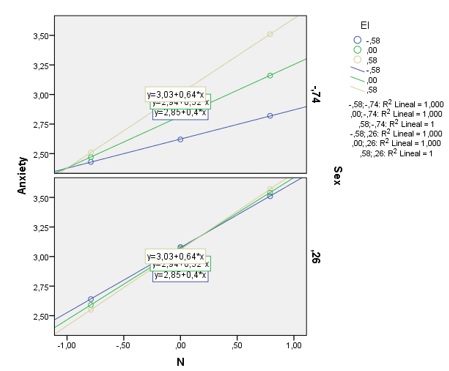
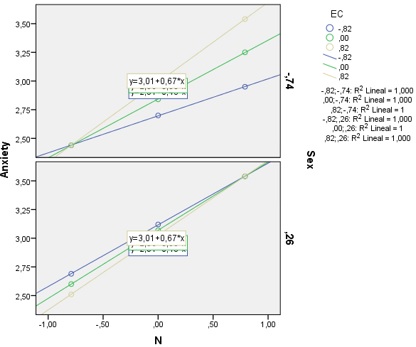
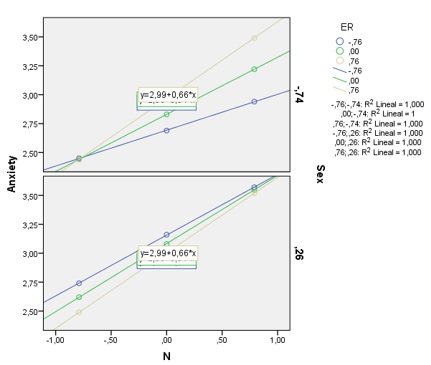
Extraversion
The results show a negative relationship between (E) and stress and depression but not for anxiety (the relationship is negative but not significant), so extraversion protects against stress and depression. Overall EI has not any effect on stress, anxiety and depression. Nevertheless, the relationship between attention to feeling and mental health is positive [stress (B=.39, p<.01), anxiety (B=.35, p<.01) and depression (B=.33, p<.01)]. Thus, students who attend more to their emotions
Openness
Students with an open personality have less depressive-type symptoms (B= -.16, p<.01). In these models, attend to emotions is also detrimental to mental health [stress (B=.37, p<.01), anxiety (B=.36, p<.01) and depression (B=.31, p<.01)]. In both (men and women), when ER is low, the relationship between openness and depression is negative, but in boys, when emotional repair is high, the relationship between openness and depression is positive. Therefore, H3 is partially supported.
Agreeableness
Students having agreeableness personality trait can have better mental health (stress, anxiety and depression) considering the results show in our models (see table
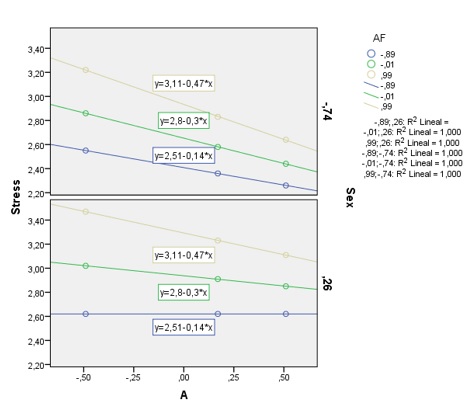
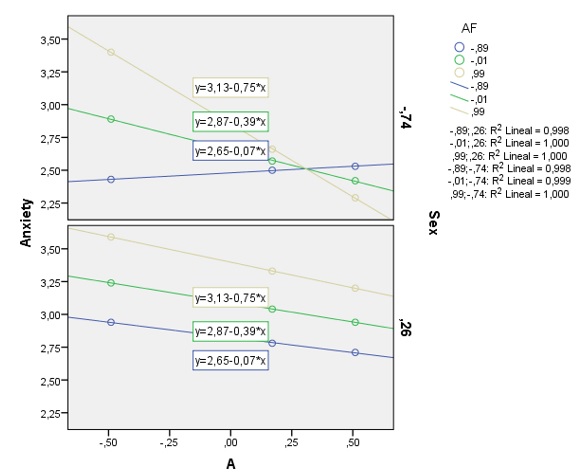
Consciousness
Students having consciousness personality trait can have better mental health (stress and depression) considering the results show in our models (see table
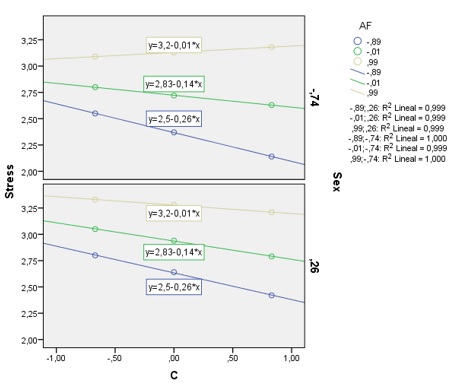
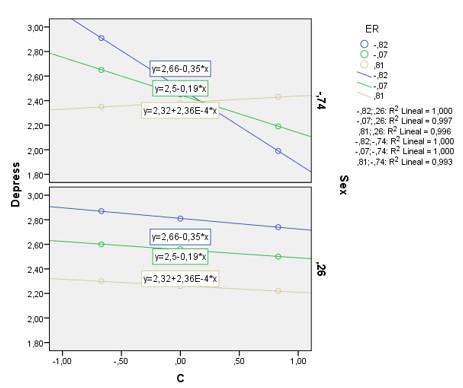
Conclusion
The aim of this study was to analyze the role of EI in the relationship between personality and mental health. Neuroticism positively correlated with stress, anxiety and depression. These results were also found by Vujičić and Ranđelović (2017) and Mostafaei et al. (2019), and similar results were reported by other studies (Brailovskaia & Margraf, 2016; Ervasti et al., 2019; Gramstad et al., 2013; Milić et al., 2019; Mousavi & Essazadegan, 2016; Pereira-Morales et al., 2019; Seto et al., 2019; Sørengaard et al., 2019). In contrast, (A) negatively correlated with stress, anxiety and depression. These correlations were reported by Mostafaei et al. (2019). In the study by Vujičić and Ranđelović (2017) it was found the same results but it was not found the stress correlation. However, Ervasti et al. (2019) found that agreeableness negatively correlated to self-reported stress. In addition, Mousavi and Essazadegan (2016) indicated that anxiety and depression negatively correlated with agreeableness. Both (E) and (C) negatively correlated with depression. These results are contrary to the results obtained by Sørengaard et al. (2019) which indicated that extraversion and conscientiousness had not a significant effect on anxiety or depression. Mousavi and Essazadegan (2016) found that anxiety negatively correlated with conscientiousness and depression negatively correlated with extraversion. However, in the study by Vujičić and Ranđelović (2017) extraversion negatively influenced anxiety, and conscientiousness negatively predicts anxiety and depression. Morevover, the correlation between consciousness and depression was found previously by different studies (Seto et al., 2019; Vujičić & Ranđelović, 2017). Furthermore, extraversion was positively correlated with all three (stress, anxiety and depression) in the study by Brailovskaia and Margraf (2016) and Gramstad et al. (2013) also found that extraversion protected against symptoms of depression. No correlations were found for openness as in the study of Vujičić and Ranđelović (2017). Nevertheless, Mousavi and Essazadegan (2016) found that anxiety negatively correlated with openness. The results of the present study are also in line with the findings obtained in the meta-analysis by Malouff, Thorsteinsson, and Schutte (2005) in which it was showed that (N) had a large effect size, (C) had a medium effect size, (E) and (A) had small effect sizes, and (O) was not significantly associated with symptoms of psychopathology. Although the order in the present work would be: (1) Neuroticism (N), (2) Agreeableness (A), (3) and (4) Extraversion (E) and Consciousness (C), and (5) Openness (O). On the basis of the results of the present study it can be concluded that the majority of personality traits benefit mental health. Although the relationships for (N) and (A) are clearer, more research is needed in the other personality traits especially in openness. Nonetheless, more studies should clarify this relationship, which is far from clear. For instance, Day, Therrien, and Carroll (2005) stated that of the five personality traits analyzed, only (N) was shown to be negatively related to well-being and positively related to strain symptoms.
On the other hand, AF positively correlated with stress, anxiety and depression. In contrast, EC negatively correlated with stress, and depression but it didn't correlate with anxiety. ER negatively correlated with all (stress, anxiety and depression). When EI was considered globally, it did not correlate significantly with either stress, anxiety-or depression. This result shows that EI should be analysed in terms of its dimensions. Because one of the dimensions AF has effects in a different direction, at least at time 1. In fact, as Salguero et al. (2012) argued although AF is negatively correlated with mental health and that EC and ER have a positive relationship with mental health at time 1. However, at time 2, AF and ER significantly predicted the psychological well-being, controlling the previous effects of psychological adjustments. Therefore, this study adds to the literature that ensures that EI has the ability to improve mental health (Bar-On, 2012; Dehghan et al., 2019; Delhom, Gutierrez, Mayordomo, & Melendez, 2018; Mirzaei et al., 2019; Salguero et al., 2012; Schutte et al., 2007). However, it would be helpful to keep in mind Delhom et al. (2018)'s suggestion that emotionally intelligent people make greater use of problem-focused strategies (than emotional strategies), and they benefit from them in achieving a positive mood and, therefore, better psychological adjustment, whereas emotional strategies foster depressed mood. In addition, more empirical evidence is needed due to the alarming situation of mental diseases worldwide and the important role EI could play in mitigating them. Futhermore, women scored higher than men on stress and anxiety but no differences were found in depression. Vujičić and Ranđelović (2017) found the same results, and in other studies women reported higher levels of job stress than males (Gramstad et al., 2013). Women also scored higher than men on (A).
The results show a negative relationship between (N) and mental health (stress, anxiety and depression) regardless of EI (AF, EC and ER). Moreover, in men the relationship between (N) and anxiety was higher the higher the EI, EC and ER were. In women the relationship between (N) and anxiety was positive regardless of EI. Attention to feeling AF has a positive relationship to stress and anxiety but not with depression and it was also found a negative relationship of ER with depression. These results are contrary to the findings of Salami (2011) which show that EI is able to buffer the negative effects of neuroticism on wellbeing. The results indicated that the relationship between (E) and mental health was not moderated by EI. However, Salami (2011) found that people who scored high in extraversion and EI showed better wellbeing than those who scored low in EI. Although in the present study the interactions did not reach significance extraverted women with high IE scores if they seem to show better mental health. Students with an open personality have less depressive-type symptoms. ER moderated the relationship between (O) and depression. In men, when ER is high, the relationship between openness and depression is positive. In both (men and women), when ER is low, the relationship between openness and depression is positive. Students having agreeableness personality trait can have better mental health (stress, anxiety and depression) considering the results. Students with high levels of AF having agreeableness personality trait have less stress and anxiety. Additionally, the negative relationship between agreeableness and stress and anxiety depending on AF is stronger in men. Students having consciousness personality trait can have better mental health (stress and depression) considering the results show in the models. Students with high levels of AF having consciousness personality trait have less stress when the AF is low and less depression when ER is low than when is high. These results are in accordance with the results of Salami (2011) which showed interactions for (N) and (E) but not for (A), (C) and (O). Some of the limitations that should be addressed in future studies are related to the measures used that attempt against the common variance method. Even though many studies in this topic do it using these measures which helps in the comparison of the data and helps to gather enough of a critical mass to advance in the future research (Schutte et al., 2007). Although the present study provides information related to other samples, relates the findings with those of longitudinal studies extracting suggestions for future studies, the design (no longitudinal), the sample size and the exclusivity of the sample (students of degree in early childhood and elementary education) limits the external validity of the study.
In conclusion, on the basis of the results it can be deduced that both emotional stability (N) and (A) are keys to mitigating stress, anxiety and depression. While (E) and (C) are for depression. On the other hand, while AF is detrimental to stress, anxiety and depression, ER is beneficial to minimize for all of them (stress, anxiety and depression). EC also has a positive effect in order to prevent stress and depression but not anxiety. In conclusion, (N), (A), attention to feeling AF and ER are key to preventing stress, anxiety and depression. Emotional Clarity (EC) in stress and depression, and (E) and (C) in depression. The role of EI by itself does not buffer the detrimental effects of (N) on mental health. EI might be more beneficial to the mental health of women with personality traits of (E), (O) and (C), and men with (A) personality trait. Therefore, the results of this study show the relevance of further analysing the role of EI in the relationship between personality and mental health. Therefore, the results of this study show the relevance of further analysing the role of EI in the relationship between personality and mental health. Given the alarming figures released by the WHO (2018, 2017) on mental diseases, it is a commitment of all society to join efforts to improve research in order to put an end to this situation.
Acknowledgments
This work was made possible with the financial support provided by the following projects: “Social Capital and Wellbeing -
References
- Bar-On, R. (2012). The impact of emotional intelligence on health and well-being: Emotional intelligencenew persceptions and applications. Croatia: InTech Europe.
- Brailovskaia, J., & Margraf, J. (2016). Comparing Facebook users and Facebook non-users: Relationship between personality traits and mental health variables–an exploratory study. PloS one, 11(12), e0166999.
- Cohen, S., Kamarck, T., & Mermelstein, R. (1983). A global measure of perceived stress. Journal of health and social behavior, 385-396.
- Cordero, A., Pamos, A., & Seisdedos, N. (1999). Inventario de Personalidad Neo Revisado (NEO PI-R). Inventario Neo Reducido de Cinco Factores (NEO-FFI). Adaptación española. Madrid, España: TEA.
- Costa, P. T., & Mc Crae, R. R. (1978). Age differences in personality structure revisited: Studies in validity, stability, and change. The International Journal of Aging and Human Development, 8(4), 261-275.
- Day, A. L., Therrien, D. L., & Carroll, S. A. (2005). Predicting psychological health: Assessing the incremental validity of emotional intelligence beyond personality, Type A behaviour, and daily hassles. European Journal of Personality: Published for the European Association of Personality Psychology, 19(6), 519-536.
- Dehghan, M. N., Karimzadeh, M., Teymouri, R., & Rostami, M. (2019). Prediction of Perceived Stress Based on Self-concept and Emotional Intelligence in Females with HIV/AIDS. Postmodern Openings/Deschideri Postmoderne, 10(1), 1-20.
- Delhom, I., Gutierrez, M., Mayordomo, T., & Melendez, J. C. (2018). Does Emotional Intelligence Predict Depressed Mood? A Structural Equation Model with Elderly People. Journal of Happiness Studies, 19(6), 1713-1726.
- Depression (2018). World Health Organization, WHO 22. Depression and Other Common Mental Disorders: Global Health Estimates. Geneva: World Health Organization; 2017.
- Ervasti, M., Kallio, J., Määttänen, I., Mäntyjärvi, J., & Jokela, M. (2019). Influence of Personality and Differences in Stress Processing Among Finnish Students on Interest to Use a Mobile Stress Management App: Survey Study. JMIR mental health, 6(5), e10039.
- Fernández-Berrocal, P., Extremera, N., & Ramos, N. (2004). Validity and reliability of the Spanish modified version of the Trait Meta-Mood Scale. Psychological reports, 94(3), 751-755.
- Gohari, Z. Y., Afjah, Z. S., & Abbasabadi, F. M. (2019). A Study on the Relation between Early Maladaptive Schemas, Emotional Intelligence and Self-harm in Adolescent Girl Students of Tehran High Schools between 2017 and 2018. Amazonia Investiga, 8(18), 94-102.
- Goldberg, D. P., Bridges, K., Duncan–Jones, P., & Grayson, D. A. (1987). Dimensions of neuroses seen in primary-care settings. Psychological Medicine, 17(2), 461-470.
- Gramstad, T. O., Gjestad, R., & Haver, B. (2013). Personality traits predict job stress, depression and anxiety among junior physicians. BMC medical education, 13(1), 150.
- Guo, Y., Ji, M., You, X., & Huang, J. (2017). Protective effects of emotional intelligence and proactive coping on civil pilots’ mental health. Aerospace medicine and human performance, 88(9), 858-865.
- Lyons, M., Evans, K., & Helle, S. (2019). Do “Dark” Personality Features Buffer Against Adversity? The Associations Between Cumulative Life Stress, the Dark Triad, and Mental Distress. Sage open, 9(1), 2158244018822383.
- MacIntyre, P., Ross, J., Talbot, K., Mercer, S., Gregersen, T., & Banga, C. A. (2019). Stressors, personality and wellbeing among language teachers. System, 82, 26-38.
- Malouff, J. M., Thorsteinsson, E., & Schutte, N. S. (2005). The relationship between the five-factor model of personality and clinical disorders: a meta-analysis. Journal of Psychopathology and Behavioral Assessment, 27, 101–114.
- Milić, J., Škrlec, I., Milić Vranješ, I., Podgornjak, M., & Heffer, M. (2019). High levels of depression and anxiety among Croatian medical and nursing students and the correlation between subjective happiness and personality traits. International Review of Psychiatry, 1-8.
- Mirzaei, S., Tame, A. I., Anbiaie, R., Moradipour, F., Nasiri, M., & Rohani, C. (2019). Emotional Intelligence as A Predictor of Health-Related Quality of Life in Breast Cancer Survivors. Asia Pac J Oncol Nurs. 6, 261-268.
- Montón, C., Pérez Echevarría, M. J., Campos, R., García Campayo, J. & Lobo, A. (1993). Escalas de ansiedad y depresión de Goldberg: una guía de entrevista eficaz para la detección del malestar psíquico. Atención Primaria, 12, 345-349.
- Mostafaei, S., Kabir, K., Kazemnejad, A., Feizi, A., Mansourian, M., Keshteli, A. H., ... & Ghadirian, F. (2019). Explanation of somatic symptoms by mental health and personality traits: application of Bayesian regularized quantile regression in a large population study. BMC psychiatry, 19(1), 207.
- Mousavi, P., & Essazadegan, A. (2016). The Relationship between Personality Traits and Anxiety Disorders with Depression in Patients with MS. Electronic J Biol, 12(4).
- Ogboghodo, E. O., Osadiaye, E., & Omosun-Fadal, T. (2018). Depression and suicidal ideation among young persons in Benin City, Edo State: An assessment of prevalence and risk factors. Journal of Mental Health and Human Behaviour, 23(2), 93.
- Pereira-Morales, A. J., Adan, A., & Forero, D. A. (2019). Perceived stress as a mediator of the relationship between neuroticism and depression and anxiety symptoms. Current Psychology, 38(1), 66-74.
- Salami, S. O. (2011). Personality and psychological well-being of adolescents: the moderating role of emotional intelligence. Social Behavior and Personality: an international journal, 39(6), 785-794.
- Salguero, J. M., Palomera, R., & Fernández-Berrocal, P. (2012). Perceived emotional intelligence as predictor of psychological adjustment in adolescents: a 1-year prospective study. European journal of psychology of education, 27(1), 21-34.
- Salovey, P., Mayer, J. D., Goldman, S. L., Turvey, C., & Palfai, T. P. (1995). Emotional attention, clarity, and repair: Exploring emotional intelligence using the Trait Meta-Mood Scale. In J. W. Pennebaker (Ed.), Emotion, Disclosure, y Health (pp. 125-151). Washington: American Psychological Association.
- Schutte, N. S., Malouff, J. M., Thorsteinsson, E. B., Bhullar, N., & Rooke, S. E. (2007). A meta-analytic investigation of the relationship between emotional intelligence and health. Personality and individual differences, 42(6), 921-933.
- Seto, A., Han, X., Price, L. L., Harvey, W. F., Bannuru, R. R., & Wang, C. (2019). The role of personality in patients with fibromyalgia. Clinical rheumatology, 38(1), 149-157.
- Sørengaard, T. A., Karlsen, H. R., Langvik, E., Pallesen, S., Bjorvatn, B., Waage, S., & Saksvik-Lehouillier, I. (2019). Insomnia as a partial mediator of the relationship between personality and future symptoms of anxiety and depression among nurses. Frontiers in psychology, 10.
- Vujičić, M. M., & Ranđelović, D. J. (2017). Personality traits as predictors of depression, anxiety, and stress with secondary school students of final years. Zbornik radova Filozofskog fakulteta u Prištini, (47-3), 217-237.
- World Health Organization (WHO). (2008, June). European Pact for mental health and Well-being. In EU Highlevel conference “Together for mental health and wellbeing": Brussels.
- World Health Organization (WHO). (2017). Depression and other common mental disorders: global health estimates (No. WHO/MSD/MER/2017.2). World Health Organization.
Copyright information

This work is licensed under a Creative Commons Attribution-NonCommercial-NoDerivatives 4.0 International License.
About this article
Publication Date
27 May 2020
Article Doi
eBook ISBN
978-1-80296-083-9
Publisher
European Publisher
Volume
84
Print ISBN (optional)
-
Edition Number
1st Edition
Pages
1-330
Subjects
Teacher training, bullying, child abuse, abusive relationship, neglected child, neglected teenager, cognitive psychology
Cite this article as:
Lira, E. M., Pueyo, A. M., Gil, M., & Gil, A. (2020). Personality And Mental Health: The Moderator Role Of Emotional Intelligence. In C. Salavera, P. Teruel, & J. L. Antoñanzas (Eds.), Observatory for Research and Innovation in Social Sciences, vol 84. European Proceedings of Social and Behavioural Sciences (pp. 148-160). European Publisher. https://doi.org/10.15405/epsbs.2020.05.17
